If we find indiscriminate state violence in our streets appalling, we should feel similarly about state violence abroad, write Medea Benjamin and Zoltán Grossman.
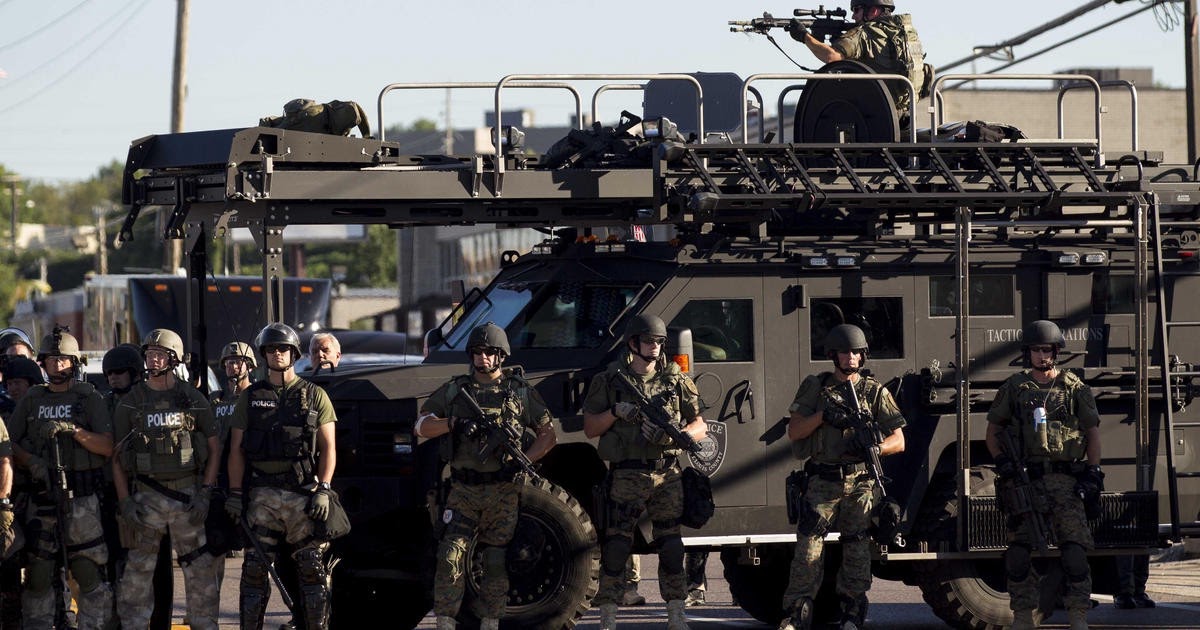
(Creative Commons)
By Medea Benjamin and Zoltán Grossman
Common Dreams

 Since George Floyd was murdered, we have seen an increasing convergence of the “war at home” against black and brown people with the “wars abroad” that the U.S. has waged against people in other countries.
Since George Floyd was murdered, we have seen an increasing convergence of the “war at home” against black and brown people with the “wars abroad” that the U.S. has waged against people in other countries.
Army and National Guard troops have been deployed in U.S. cities, as militarized police treat our cities as occupied war zones. In response to this “endless war” at home, the growing and thunderous cries for defunding the police have been echoed by calls for defunding the Pentagon’s wars.
Instead of seeing these as two separate but related demands, we should see them as intimately linked, since the racialized police violence on our streets and the racialized violence the U.S. has long inflicted on people around the world are mirror reflections of each other.
We can learn more about the war at home by studying the wars abroad, and learn more about the wars abroad by studying the war at home. Here are some of those connections:
- The U.S. kills people of color at home and abroad. The United States was founded on the ideology of white supremacy, from the genocide against Native Americans to upholding the system of slavery.S. police kill about 1,000 people per year, disproportionately in the black community and other communities of color. U.S. foreign policy is similarly based on the white superiority-derived concept of “American exceptionalism,” in tandem with European partners. The endless series of wars the U.S. military has fought abroad would not be possible without a view of the world that dehumanizes foreign peoples. “If you want to bomb or invade a foreign country filled with black- or brown-skinned people, as the United States military so often does, you have to first demonize those people, dehumanize them, suggest they’re backward people in need of saving or savage people in need of killing,” said journalist Mehdi Hasan. The U.S. military has been responsible for the deaths of many hundreds of thousands of black and brown people around the world, and the denial of their rights to national self-determination. The double standard that sanctifies the lives of U.S. troops and citizens, but disregards the people whose countries the Pentagon and its allies destroy is as hypocritical as the one that values white lives over black and brown lives at home.
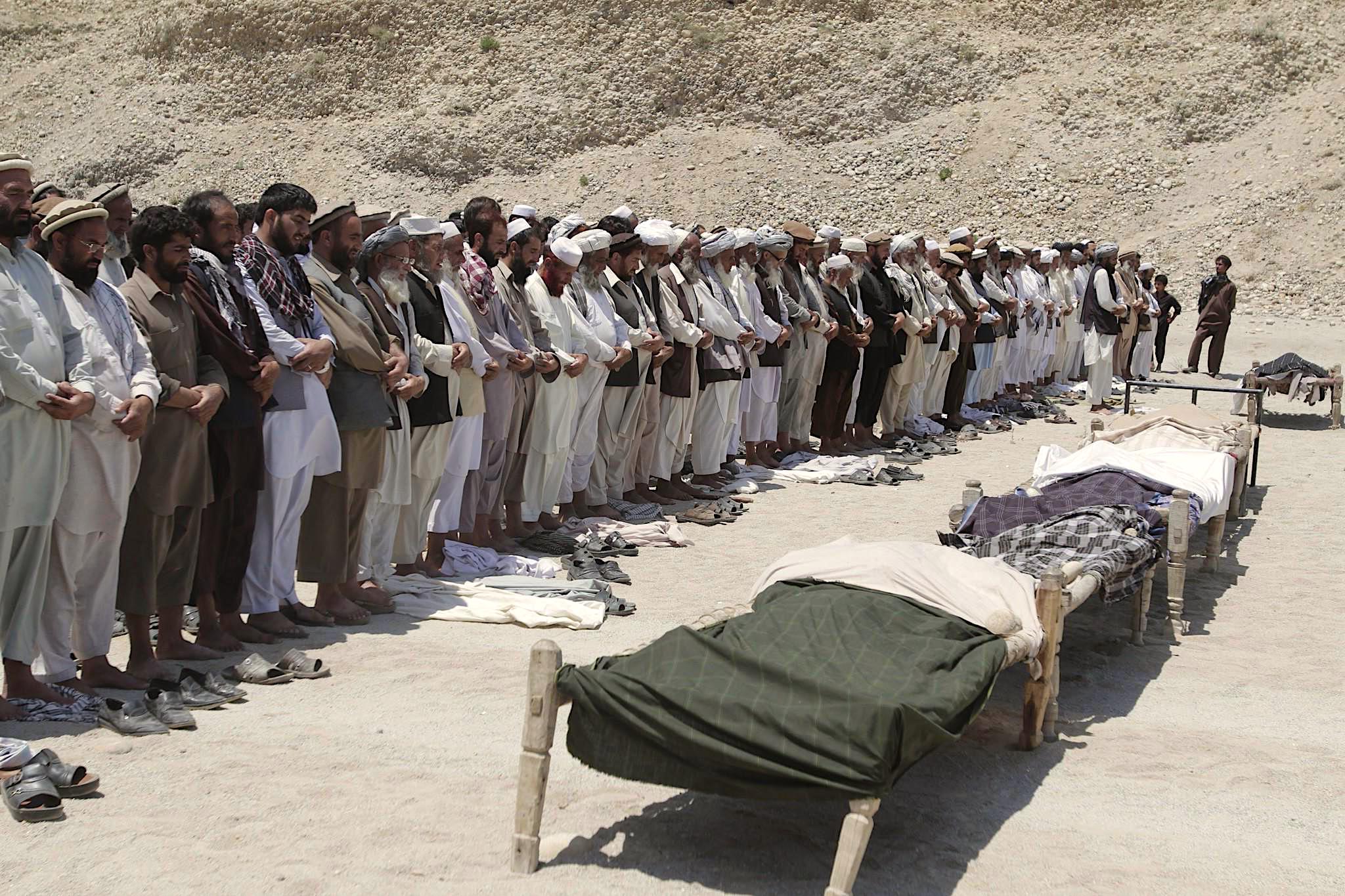
Burying civilians in Afghanistan. (Ariana News)
- Just as the U.S. was created by taking over the lands of indigenous peoples by force, so America as an empire uses war to expand access to markets and resources. Settler colonialism has been an “endless war” at home against indigenous nations, who were colonized when their lands were still defined as foreign territories, to be annexed for their fertile land and natural resources. The Army forts stationed in native nations back then were the equivalent of foreign military bases today, and the native resisters were the original “insurgents” who were in the way of American conquest. The “Manifest Destiny” colonization of native lands morphed into overseas imperial expansion, including the seizure of Hawai’i, Puerto Rico, and other colonies, and the counterinsurgency wars in the Philippines and Vietnam. In the 21st century, U.S.-led wars have destabilized the Middle East and Central Asia, while increasing control over the region’s fossil fuel resources. The Pentagon has used the template of the Indian Wars to frighten the American public with the specter of “lawless tribal regions” that need to be “tamed,” within countries such as Iraq, Afghanistan, Yemen and Somalia. Meanwhile, Wounded Knee in 1973 and Standing Rock in 2016 show how settler colonialism can become remilitarized back in the U.S. “homeland.” Stopping oil pipelines and toppling Columbus statues shows how indigenous resistance can also be renewed in the heart of the empire.

The fallen Christopher Columbus statue outside the Minnesota State Capitol after a group led by American Indian Movement members tore it down in St. Paul, Minnesota, on June 10. (Tony Webster)
- The police and military are both internally plagued by racism. With the Black Lives Matter protests, many people have now learned about the origins of U.S. police in all-white slave patrols. It is no accident that hiring and promotion within police departments have historically favored whites, and officers of color around the country continue to sue their departments for discriminatory practices. The same is true in the military, where segregation was official policy until 1948. Today, people of color are pursued to fill the bottom ranks, but not the top positions. Military recruiters set up recruiting stations in communities of color, where government disinvestment in social services and education makes the military one of the few ways to not only get a job, but access to health care and a free college education. That’s why about 43 percent of the 1.3 million men and women on active duty are people of color, and Native Americans serve in the Armed Forces at five times the national average. But the upper echelons of the military remain almost exclusively a white-boys’ club (of the 41 senior commanders, only two are black and only one is a woman). Under President Donald Trump, racism in the military is on the rise. A 2019 survey found that 53 percent of servicemembers of color said they had seen examples of white nationalism or ideologically driven racism among their fellow troops, a number up significantly from the same poll in 2018. Far-right militias have attempted to both infiltrate the military and collude with police.
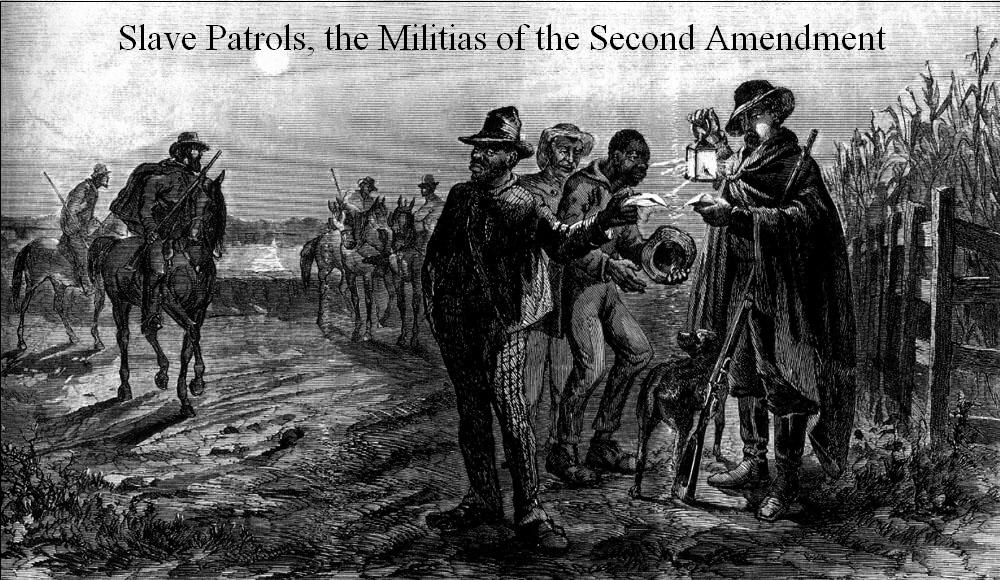
Depiction of slave patrol. (AEsquibel23, CC BY-SA 4.0, Wikimedia Commons)
- The Pentagon’s troops and “surplus” weapons are being used on our streets. Just as the Pentagon often uses the language of “police actions” to describe its foreign interventions, police are being militarized within the U.S. When the Pentagon ended up in the 1990s with weapons of war it no longer needed, it created the “1033 Program” to distribute armored personnel carriers, submachine guns, and even grenade launchers to police departments. More than $7.4 billion in military equipment and goods have been transferred to more than 8,000 law enforcement agencies — turning the police into occupation forces and our cities into war zones. We saw this vividly in 2014 in the aftermath of the killing of Michael Brown, when police flush with military gear made the streets of Ferguson, Missouri, look like Iraq. More recently, we saw these militarized police forces deployed against the George Floyd Rebellion, with military helicopters overhead, and the Minnesota governor comparing the deployment to an “overseas war.” Trump has deployed federal troops and wanted to send in more, much as active-duty troops were previously used against several workers’ strikes in the 1890s-1920s, the Bonus Army veterans’ protests of 1932, and black uprisings in Detroit in 1943 and 1967, in multiple cities in 1968 (after the assassination of Dr. Martin Luther King Jr.), and in Los Angeles in 1992 (after the acquittal of the police who had beaten Rodney King). Sending in soldiers trained for combat only makes a bad situation worse, and this can open the eyes of Americans to the shocking violence with which the U.S. military tries, but often fails, to quell dissent in occupied countries. Congress may now object to the transfer of military equipment to police, and Pentagon officials may object to using troops against U.S. citizens at home, but they rarely object when the targets are foreigners or even U.S. citizens who live abroad.
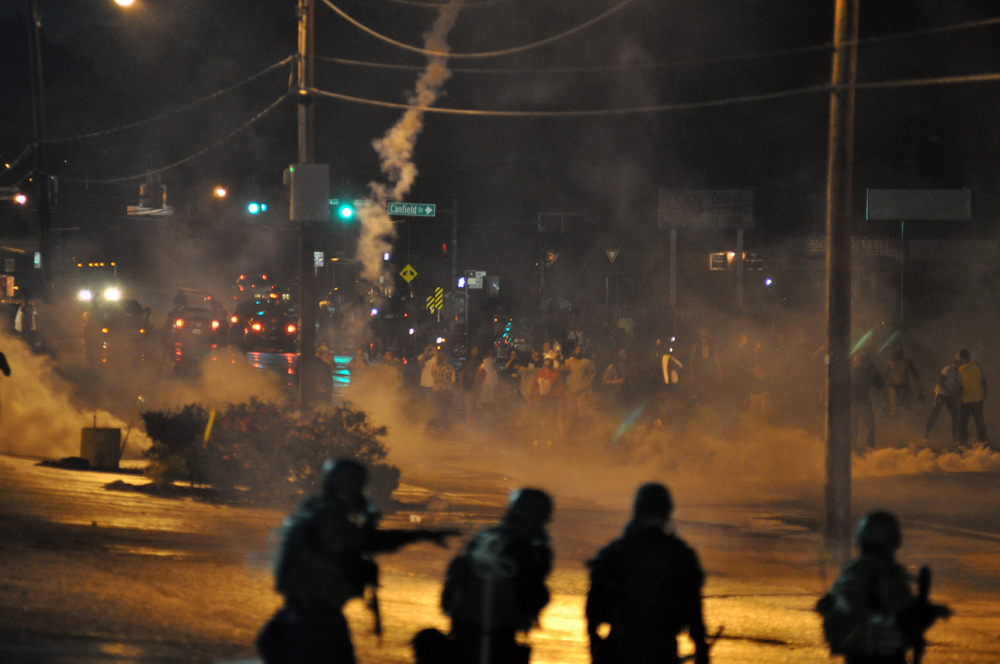
Black Lives Matter protests in Ferguson, Missouri, Aug. 17, 2014. (Loavesofbread, CC BY-SA 4.0, Wikimedia Commons)
- U.S. interventions abroad, especially the “War on Terror,” erode our civil liberties at home. Techniques of surveillance that are tested on foreigners have long been imported to suppress dissent at home, ever since occupations in Latin America and the Philippines. In the wake of the 9/11 attacks, while the U.S. military was purchasing super drones to kill U.S. enemies (and often innocent civilians) and collect intelligence on entire cities, U.S. police departments began buying smaller, but powerful, spy drones. Black Lives Matter protesters have recently seen these “eyes in the sky” spying on them. This is just one example of the surveillance society that the U.S. has become since 9/11. The “War on Terror” has been a justification for the tremendous expansion of government powers at home — broad “data mining,” the increased secrecy of federal agencies, No-Fly lists to prohibit tens of thousands of people from traveling, and vast government spying on social, religious and political groups, from the Quakers to Greenpeace to the ACLU, including military spying on antiwar groups. The use of unaccountable mercenaries abroad also makes their use more likely at home, as when Blackwater private security contractors were flown from Baghdad to New Orleans in the wake of Hurricane Katrina in 2005, to be used against the devastated black community. And in turn, if police and armed far-right militias and mercenaries can commit violence with impunity in the homeland, it normalizes and enables even great violence elsewhere.
- The xenophobia and Islamophobia at the heart of the “War on Terror” has fed hatred of immigrants and Muslims at home. Just as wars abroad are justified by racism and religious bias, they also feed white and Christian supremacy at home, as could be seen in Japanese-American incarceration in the 1940s, and anti-Muslim sentiment that rose in the 1980s. The 9/11 attacks precipitated hate crimes against Muslims and Sikhs, as well as a federally imposed travel ban that denies entrance to the U.S. for people from entire countries, separating families, depriving students of access to universities and detaining immigrants in private prisons. Senator Bernie Sanders, writing in Foreign Affairs, said, “When our elected leaders, pundits, and cable news personalities promote relentless fear-mongering about Muslim terrorists, they inevitably create a climate of fear and suspicion around Muslim American citizens — a climate in which demagogues like Trump can thrive.” He also decried the xenophobia resulting from turning our immigration debate into a debate about Americans’ personal security, pitting millions of U.S. citizens against undocumented and even documented immigrants. The militarization of the U.S.-Mexico border, using hyperbolic claims of infiltrating criminals and terrorists, has normalized the use of drones and checkpoints that bring the techniques of authoritarian control into the “homeland.” (Meanwhile, U.S. Customs and Border Protection personnel were also deployed to the borders of occupied Iraq.)
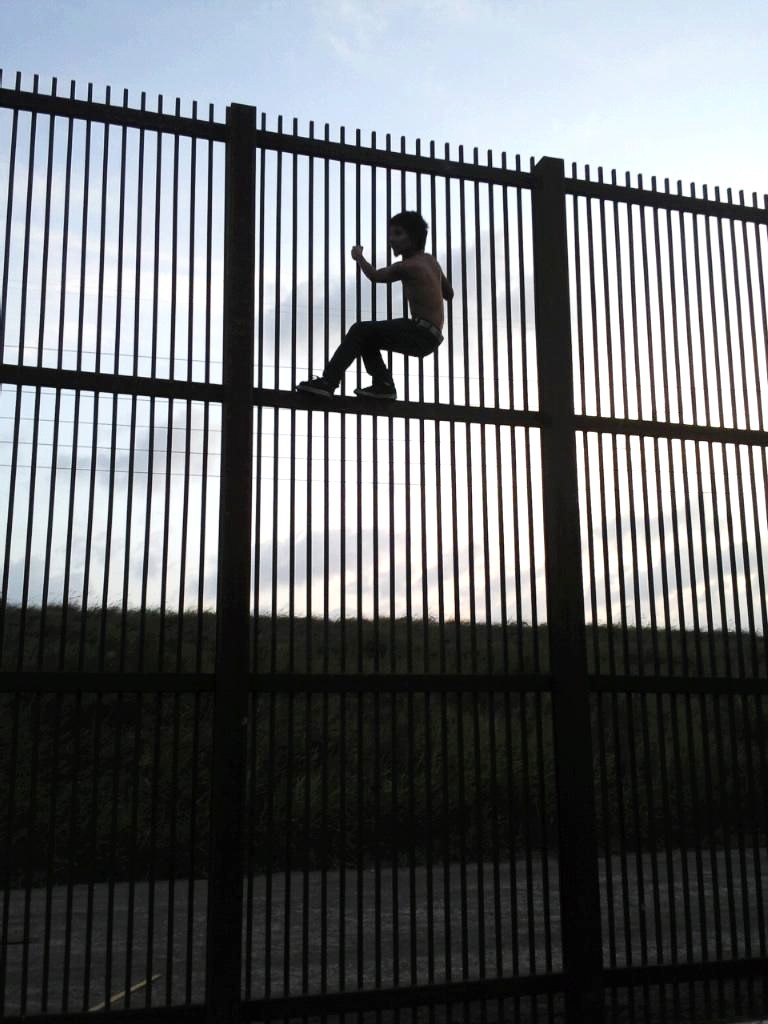
A child climbs the US-Mexico border wall, Brownsville, Texas. 2009. (Wikipedia)
- Both the military and the police suck up enormous amounts of taxpayer dollars that should be used for building a just, sustainable, and equitable society. Americans are already participating in supporting state violence, whether we realize it or not, by paying taxes to the police and military that carry it out in our names. Police budgets account for an astronomical percentage of cities’ discretionary funds compared to other crucial community programs, ranging from 20 to 45 percent of discretionary funding in major metropolitan areas. Per-capita police spending in the city of Baltimore for 2020 is an astounding $904 (imagine what every resident could do with $904). Nationwide, the U.S. spends more than twice as much on “law and order” as it does on cash welfare programs. This trend has been widening since the 1980s, as we have taken funds out of poverty programs to put into fighting crime, the inevitable consequence of that neglect. The same pattern is true with the Pentagon budget. The 2020 military budget of $738 billion is larger than the next 10 countries combined. The Washington Post reported that if the U.S. spent the same proportion of its GDP on its military as most European countries do, it “could fund a universal child-care policy, extend health insurance to the approximately 30 million Americans who lack it, or provide substantial investments in repairing the nation’s infrastructure.” Closing the 800+ overseas military bases alone would save $100 billion dollars a year. Prioritizing the police and military means deprioritizing resources for community needs. Even President Dwight Eisenhower described military spending in 1953 as “a theft from those who hunger and are not fed.”
- Repressive techniques used abroad inevitably come home. Soldiers are trained to see most of the civilians they encounter abroad as a potential threat. When they return from Iraq or Afghanistan, they discover that one of the few employers that give priority to vets are police departments and security companies. They also offer relatively high salaries, good benefits, and union protections, which is why 1-in-5 police officers is a veteran. So, even soldiers who come home with PTSD or drug and alcohol abuse, instead of being adequately cared for, are given weapons and put out on the streets. No wonder studies show that police with military experience, especially those who have deployed overseas, are significantly more likely to be involved in shooting incidents than those with no military service. The same relationship of repression at home and abroad is true of torture techniques, which were taught to militaries and police throughout Latin America during the Cold War. They were also used on Afghans at the U.S.-run Bagram Air Base prison, and on Iraqis at the Abu Ghraib prison, where one of the torturers had practiced similar techniques as a prison guard in Pennsylvania. The purpose of waterboarding, a torture technique stretching back to counterinsurgency wars in Native America and the Philippines, is to prevent a person from breathing, much like the police chokehold that killed Eric Garner or the knee to the neck that killed George Floyd. #ICantBreathe is not only a statement for change at home, but also a statement with global implications.

Protesters at a rally in NYC in support of Ferguson, Missouri protests, Nov. 25, 2014. (The All-Nite Images, Flickr)
- The War on Drugs has put more money into the police and military but has been devastating to people of color, at home and abroad. The “War on Drugs” has devastated communities of color, particularly the black community, leading to catastrophic levels of gun violence and mass incarceration. People of color are more likely to be stopped, searched, arrested, convicted, and harshly sentenced for drug-related offenses. Nearly 80 percent of people in federal prison and almost 60 percent of people in state prison for drug offenses are black or Latinx. The War on Drugs has also devastated communities overseas. Throughout South America, the Caribbean, and Afghanistan in both drug production and trafficking areas, U.S.-supported wars have only empowered organized crime and drug cartels, leading to an upsurge of violence, corruption, impunity, erosion of rule of law, and massive human rights violations. Central America is now home to some of the world’s most dangerous cities, leading to the mass migration to the U.S. that Trump has weaponized for political purposes. Just as police responses at home do not solve social problems that stem from poverty and despair (and often create more harm than good), military deployments abroad do not resolve historical conflicts that usually have their roots in social and economic inequalities, and instead create a cycle of violence that worsens the crisis.
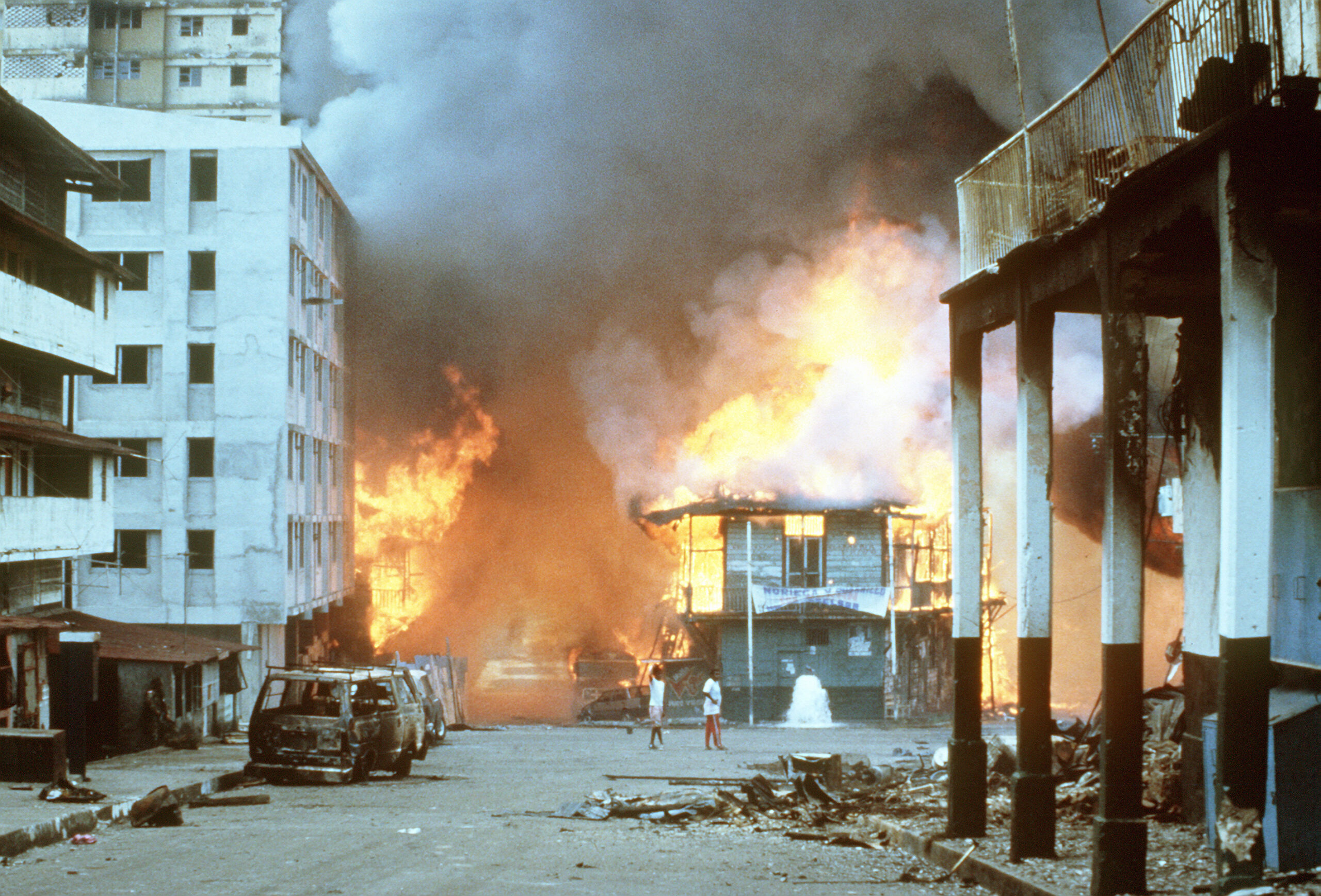
U.S. military invasion of Panama in 1989. (Wikimedia Commons)
- Lobbying machines solidify support for police and war industry funding. Law enforcement lobbies have long built support for police and prisons among state and federal politicians, using a fear of crime, and a desire for the profits and jobs that are funneled to its backers. Among the strongest backers are police and prison guard unions, which instead of using the labor movement to defend the powerless against the powerful, defend their members against community complaints of brutality. The military-industrial complex similarly uses its lobbying muscle to keep politicians compliant with its wishes. Every year billions of dollars are funneled from U.S. taxpayers to hundreds of arms corporations, who then wage lobbying campaigns pushing for even more foreign military aid and weapons sales. They spend $125 million a year on lobbying, and another $25 million a year on donating to political campaigns. Manufacturing weapons has provided millions of workers with some of the nation’s highest industrial wages, and many of their unions (such as the Machinists) are part of the Pentagon lobby. These lobbies for the military contractors have become more powerful and influential not only over the budget but also over the creation of U.S. foreign policy. The power of the military-industrial complex has become far more dangerous than even President Eisenhower himself feared when he warned the nation, in 1961, against its undue influence.
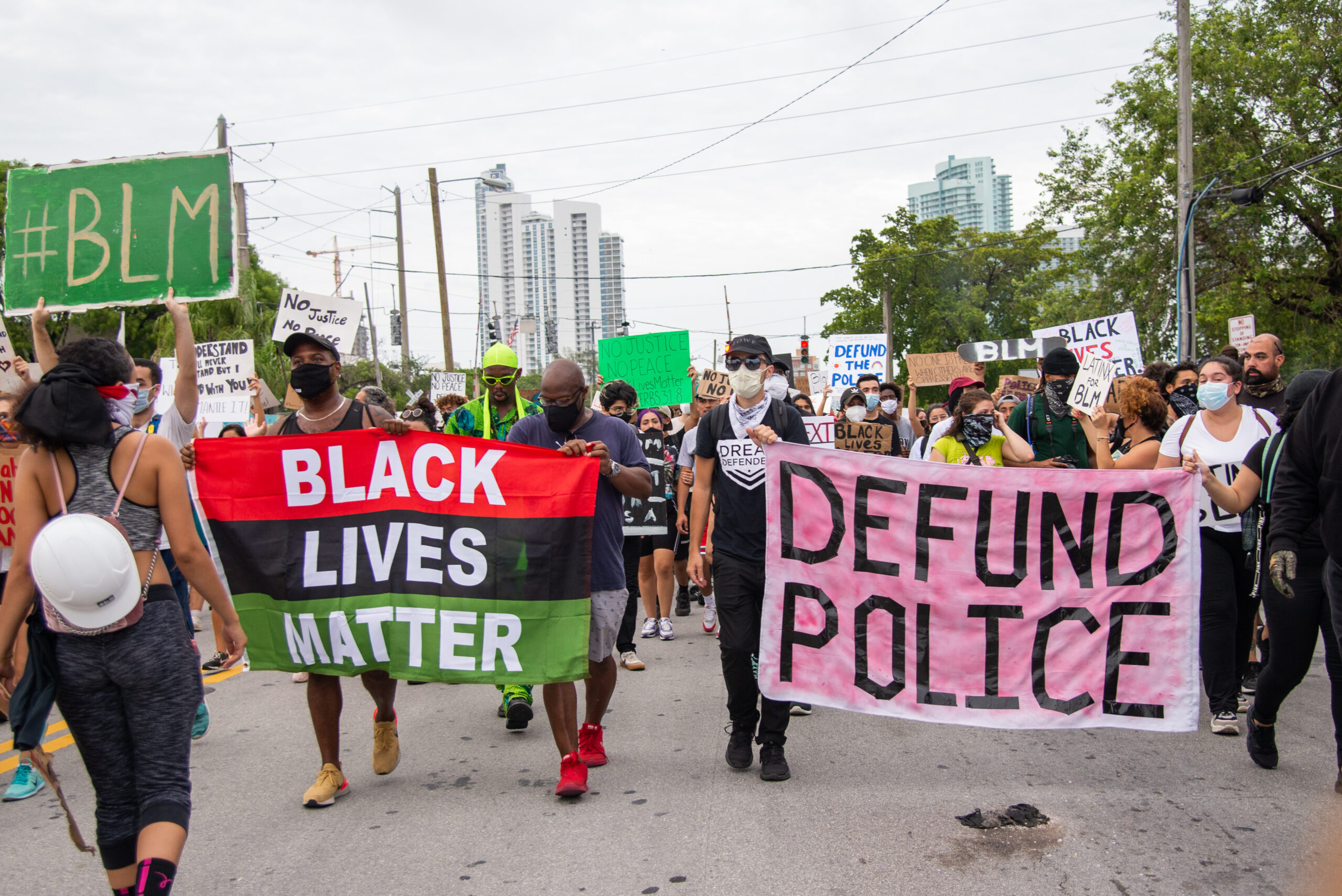
George Floyd Miami Protest, June 7, 2020. (Mike Shaheen, CC BY 2.0, Wikimedia Commons)
Both “defunding the police” and “defunding war,” while opposed by most elected Republicans and mainstream Democrats, are gaining public support. Mainstream politicians have long been afraid of being painted as “soft on crime” or as “soft on defense.” This self-perpetuating ideology reproduces the idea that the U.S. needs more police on the streets and more troops policing the world, or else chaos will reign.
The mainstream media has kept politicians afraid to offer any kind of alternate, less militaristic vision. But the recent uprisings have turned “Defund the Police” from a fringe chant to a national conversation, and some cities are already reallocating millions of dollars from the police to community programs.
Likewise, until recently, calling for cuts to U.S. military expenditure was a great taboo in Washington, D.C. Year after year, all but a few Democrats lined up with Republicans to vote for massive increases in military spending. But that is now beginning to change.
Congresswoman Barbara Lee introduced an historic, aspirational resolution proposing massive $350 billion in cuts, which is over 40 percent of the Pentagon budget. And Senator Bernie Sanders, along with other progressives, introduced an amendment to the National Defense Authorization Act to cut the Pentagon budget by 10 percent.
Just as we want to radically redefine the role of police in our local communities, so we must radically redefine the role of military personnel in the global community.
As we chant “Black Lives Matter,” we should also remember the lives of people dying every day from U.S. bombs in Yemen and Afghanistan, U.S. sanctions in Venezuela and Iran, and U.S. weapons in Palestine and the Philippines. The killing of black Americans rightly elicits masses of protesters, which can help open a window of awareness about the hundreds of thousands of non-American lives taken in U.S. military campaigns.
As the platform of the Movement for Black Lives says: “Our movement must be tied to liberation movements around the world.”
Those who are now questioning an increasingly militarized approach to law enforcement should also question a militarized approach to foreign relations. Much as unaccountable police in riot gear are a danger to our communities, so, too, an unaccountable military, armed to the teeth and functioning largely in secret, is a danger to the world.
During his iconic anti-imperialist speech, “Beyond Vietnam,” Dr. King famously said: “I could never again raise my voice against the violence of the oppressed in the ghettos without having first spoken clearly to the greatest purveyor of violence in the world today: my own government.”
The protests to “Defund the Police” have compelled Americans to see beyond police reform to a radical reconceiving of public safety. So, too, we need a radical reconceiving of our national security in the slogan “Defund War.”
If we find indiscriminate state violence in our streets appalling, we should feel similarly about state violence abroad, and call for divesting from both police and the Pentagon, and reinvesting those taxpayer dollars to rebuild communities at home and abroad.
Medea Benjamin is cofounder of CODEPINK for Peace, and author of several books, including “Inside Iran: The Real History and Politics of the Islamic Republic of Iran” and “Drone Warfare: Killing by Remote Control.”
Zoltán Grossman is a professor of geography and native studies at The Evergreen State College in Olympia, Washington. He is author of “Unlikely Alliances: Native Nations and White Communities Join to Defend Rural Lands,” and co-editor of “Asserting Native Resilience: Pacific Rim Indigenous Nations Face the Climate Crisis.”
The views expressed are solely those of the author and may or may not reflect those of Consortium News.
Please Contribute to Consortium
News on its 25th Anniversary
Donate securely with  PayPal here.
PayPal here.
Or securely by credit card or check by clicking the red button:

I would like to thank Medea Benjamin and Zoltan Grossman for this excellent article and the other anitwar work they have done. When I commented more on blogs, I frequently got into discussions about US Military Interventions and referred to his list of military interventions on his website for evidence. There aren’t many and they frequently disappear.
FROM WOUNDED KNEE TO SYRIA
U.S. MILITARY INTERVENTIONS SINCE 1890
By Dr. Zoltan Grossman
hXXps://sites.evergreen.edu/zoltan/interventions/
An economist heard on Alternative Radio explained why war is so popular with our ruling elites: NOTHING USES UP NATURAL RESOURCES FASTER THAN WAR, and using up natural resources is what enriches the already grotesquely wealthy. Funding schools and health care, providing housing and nutrition, does not make the uber-rich richer. Yes, if one has a functioning brain it makes the ruling class safer and all of us more secure, but the sociopathic class does not think in these terms. They never have throughout history and they’re not going to now.
Oh so true – I would only add psychopathic as a reality of the corporate-capitalist-imperialist-plutocratic ruling elites of this country (and others, especially in the western world wherein it is presumed that “we” the low melanin lot are, bien sur, in charge and rightfully so because, well, we’re more “civilized,” more “advanced” etc……
Thank you Medea Benjamin and Zoltán Grossman for connecting our domestic terrorism with our foreign terrorism against black and brown people and ultimately, I believe, against all of us in our long, long history of violence perpetrated in our name and with our tax dollars to steal.
Daniel Immerwahr’s 2020 “How to Hide and Empire” goes deeply into the ugly racism at the very top of our power structure that has wreaked havoc at home and abroad while stealing wealth from the victims.
It’s always about the money and power…..
And therefore one must conclude that the root of the violence is intertwined with its usefullness to the most powerful in their thirst for more power and more wealth.
The demonizing of goups of people and/or foreign (democratically elected or not) presidents/prime ministers if they won’t hand over their natural resources but wish to use them for the people in their own country drive the coups. (We’re fed lies to get our acquiescence.)
I’m trying (but not doing well at it) to make the connection between this ugly rampage/torture/predation and the financial/corporate titans who strongly influence foreign and domestic policy.
A surprising (for me) example of the behind the scenes viciousness is exposed in the Canadian docudrama (on youtube) starring Christopher Plummer as Lester B Pearson’s British ambassador who was targeted by the intelligence services and why it happened (the same old story). The 2002 film, “Agent of Influence” relied on then newly declassified RCMP records.
This time it wasn’t the black or brown but the homosexual excuse for demonization of someone seen to stand in the way of the thirst of predatory profiting.
And all the fearmongering that’s used to buy our acquiescence is simply a smoke screen for the vicious violence.
Ray McGovern’s #MICIMATT serves it.
military-industrial-congressional-intelligence-media-academia-think-tank complex
I’ve been trying to understand why/if the neocons’ agenda, including Bolton’s always dovetails with the financial power structure.
Do the absurd Dr Strangelove’s among choose their agenda knowing who it actually serves? The money and power?
Are they after all just panderers whose flimsy excuses for war they don’t even believe?
FWIW Humans share some of this viciousness with ants:
By Sandhya Sekar
28 October 2015
BBC dot com
Not far from you, ants are fighting for their freedom.
They have been victimised by “slave-maker” ants, which subjugate other ant species to do their work for them. To recruit slaves, the slave-makers deploy troops that conduct raids on surrounding colonies.
The system can be terrifyingly effective, in a sense akin to the horrific methods humans have used to keep slaves in line. The enslaved ants pay the ultimate price: they do not get to reproduce.
But the slave-makers do not get it all their own way. Some of their victims are fighting back. This battle is being fought, not just from day to day, but over evolutionary time – and nobody yet knows how it will end.
It is more likely to lead to Robot cops that will kill you just as quick as Human ones.
Excellent article which brings out that:
“Congresswoman Barbara Lee introduced an historic, aspirational resolution proposing massive $350 billion in cuts, which is over 40 percent of the Pentagon budget. And Senator Bernie Sanders, along with other progressives, introduced an amendment to the National Defense Authorization Act to cut the Pentagon budget by 10 percent.”
Proposing to cut the Pentagon budget by only 10 percent should not be considered all that laudatory by someone who promised to create a “political revolution.” Sanders’ desire to cut back on the Pentagon budget by a mere 10% should not be viewed as being that noteworthy as Sanders’ alleged radicalism is apparently not ready to roil the sensibilities of the two major militant political parties. And no mention of Sanders of closing down all those military bases around the globe which are costing U.S. taxpayers a whopping $100 billion a year.
Indeed, Erroll. Barbara Lee is clearly more in tune with what is absolutely necessary than Sanders would ever be willing to do. Mind you, I think, given all of the money that we, the ordinary taxpayers have – without our say so – fed into the ever-gaping maw of the MIC (every bloody year), they need *Defunding.* Pronto.
As for those military bases all around the bloody world – not only do they cost us more than free at point of service healthcare for all citizens would; They Cost the Planet even more with all of the pollution they produce (and DO NOT clean up properly), as well as costing the inhabitants of the countries wherein they exist much more than our dollars: dreadful birth defects, cancers and other awful, surely criminal things.
Defunding Police will lead to Robocops programed with AI that are not controlled by Isaac Asimov’s Three Laws of Robotics.
Asimov’s Three Laws are as follows:
A robot may not injure a human being or, through inaction, allow a human being to come to harm.
A robot must obey the orders given it by human beings except where such orders would conflict with the First Law.
A robot must protect its own existence as long as such protection does not conflict with the First or Second Laws.